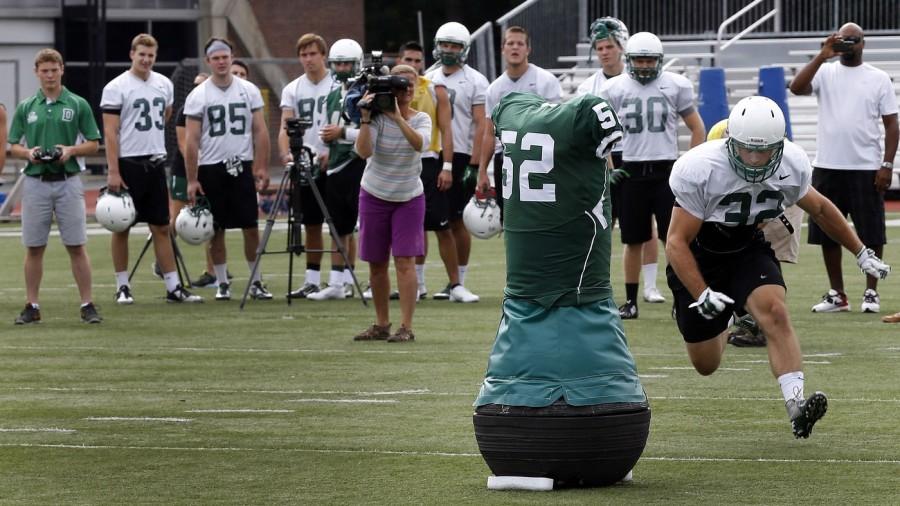Technology aids in concussion prevention
New advancements in prevention of concussions at Dartmouth College begin to set standard for programs nationwide
November 2, 2015
The Dartmouth College Football program has added a new player to their already full roster. He stands 5-feet, 10-inches and weighs in at 160 pounds with an impressive 4.7 time for his 40-yard dash. The new player is actually controlled by a team assistant on the sidelines. It is a Mobile Virtual Player (MVP), a football dummy on wheels that players tackle instead of their teammates.
A few years ago, Dartmouth Football Head Coach Buddy Teevens asked the engineering students at Thayer School of Engineering at Dartmouth to replicate a moving target as a class project and now implements the product into his “no contact” practice.
“Our thought was that we could teach tackling more safely and technically,” Teevens said. “Now, the MVPs have taken on a life of their own and we have professional and college teams calling about them.”
Concussions are an issue that every sports team faces during their season. Recently, Illinois has passed bill SB0007 that requires high school athletes who suffer from a concussion to receive clearance from a doctor to return to their sport. At LT, students who are suspected to have a concussion take the screening test that they took before the season started and have to follow a strict road back to their sport that includes doctor visits and daily check-ins with an athletic trainer.
“A lot of [our precaution] has to do with who we are as Lyons Township,” varsity football Head Coach Kurt Weinberg said. “Everything we do is always in the best interest of our kids, whether it be academically or athletically.”
To further prevent concussions during the football season, players are supplied with the SpeedFlex helmet from Riddell, which is the most reliable concussion-preventing helmet made by Riddell, Weinberg said. The LT coaches have also changed their tackling to a style called “heads up tackling”. Teevens has opposite opinions towards the tackling technique.
“I have issues with heads up tackling,” Teevens said. “Heads up has players practicing things that don’t happen in a typical game. I have tried to simulate what actually happens with the use of MVPs.”
According to Weinberg, most concussions occur in younger players at LT because of their lack of knowledge in the proper way to tackle, lack of strength, and are unfamiliar with the signs of a concussion.
Concussions have never been consistent throughout the years at LT. There are weeks where multiple athletes came in with symptoms, but also seasons where the trainers don’t see someone with a concussion for a month, Head Athletic Trainer Robert Fichter said.
“Technique is the biggest factor in preventing concussions,” Weinberg said. “Equipment also plays a large role along with the strengthening of the athlete.”
The football coaches attend clinics during the offseason, not only on playwriting but also on concussion and heat awareness. When an athlete is diagnosed with a concussion, they are treated independently and based on their symptoms alone.
“We don’t look at concussions in identical fashion at LT,” Fichter said. “We treat each concussion on a case to case basis.”
If an athlete has any symptoms of a concussion, he is automatically out of their sport for one week. Within the seven days, the athlete needs to have two consecutive rest days, followed by two consecutive days of exertion testing on the treadmill and then he is allowed to return to practice with no contact. If no symptoms were present through six sequential days, the following day would be the last day before the athlete could return to a limitation-free practice.
“It’s a complicated process that also involves our team doctor,” Fichter said. “He has the final say and plays a major role in the concussion protocol.”
When a football player is out with a concussion, he either chooses to film or help with equipment to stay up to date with the team.
“A concussion can be impactful depending on who the player is and how quickly he is able to recover and get back into the game,” Weinberg said. “It’s a process to come back [after a concussion].”
The engineering students at Dartmouth and Teevens have applied their efforts to create MVPs for high school, junior high and other college athletes. The MVP could be an answer to their problems- to reduce the probability that an athlete gets a concussion.
“LT is always willing to explore whatever is in the best interest of our athletes,” Weinberg said.
LT alumnus and Dartmouth linebacker Will Konstant ‘12 has been able to use the MVPs during practices and has not sustained a major injury.



















![Movie poster for '[Rec]" (2007).](https://www.lionnewspaper.com/wp-content/uploads/2023/04/rec-640x900.jpg)


